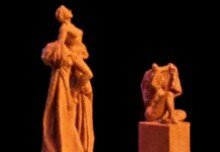
Sometimes writers who inhabit the margins of the literary world are the ones who produce the most dramatic and visionary work. Chimako Tada holds such a place in the world of twentieth-century Japanese poetry. Although she was well known and respected in her native Japan for her softly supple and beautiful language, she spent most of her career working at the edge of the Japanese poetic world.
Apart from her earliest years and the final, traumatic year of World War II, Tada spent most of her youth in Tokyo, but after college, she moved in 1956 with her new husband to the port town of Kobe, located in western Japan. For five decades, she lived there in a house on a sharply sloping street at the base of Mt. Rokko. Unlike many of her contemporaries who lived in Tokyo, where they could maintain close ties with fellow poets and publishers, Tada worked in relative isolation, only maintaining contact through letters and the distance of the written word. This isolation was sometimes the source of personal sadness, but it was also fruitful, as it encouraged her to think independently and allowed her to work in ways that did not necessarily parallel the quickly shifting trends of the capital.
Whereas many other poets drew upon one another for inspiration and support, Tada turned instead to the Greek, Latin, Chinese, and Japanese classics. Since her youth, she had been an avid reader of classical literature. In fact, she once quipped that as a girl, she was not especially girly; Plutarch’s biographies and the Chinese Tale of the Three Kingdoms (Sanguo zhi) were among her favorite books.
Perhaps it is no wonder that many of her early poems, such as ‘The Tower of Vega’ and ‘Moonstone Woman’, both included in this issue of PIW, describe places and figures that seem right out of classical history or mythology. Just to give one example, the first line of the last stanza of the poem ‘Mirrors,’ also included in this special issue, is borrowed from a poem about the battle of Thermopylae by the Greek poet Simonides of Ceos (c. 556 BC-468 BC). Because Tada worked so often with classical motifs, it is fair to say that she was not just a Japanese poet; she was also a poet of the world.
One of the major themes of Tada’s poetry is to explore the inner, psychological experiences of women in mythology and in the modern world. Many of these are women who are isolated from society and their surroundings by circumstance. For instance, the poem ‘Yamanba’ describes the poet’s sympathy for the kind of frightening witch that Japanese folklore describes as inhabiting the mountains at the edge of society. In one of her most dramatic poems, ‘The Mysterious Woman of the Shadows, or the Valley of Sheep’, Tada provides a startling re-envisioning of the “mysterious woman” in the Chinese Daoist classic, the Dao de jing. Unlike Lao Zi who uses the image of the “mysterious woman” as a source of productive fertility, Tada describes the wrenching emotional and physical pain of the woman who is treated as little more than birth-giver.
In addition to her prodigious poetic output, Tada was also a prominent translator of French literature. Her outstanding translations of Marguerite Yourcenar helped to earn Yourcenar a prominent following in Japan and are still remembered today as masterpieces of translation. Other translations include the work of Saint-John Perse, Antonin Artaud, Joseph Kessel, and Julien Green.
In 2003, Tada died after a long battle with uterine cancer. In a eulogy that appeared in the newspaper Nihon keizai shinbun, the feminist poet Shiraishi Kazuko lauded Tada as a rare “goddess of intellect and beauty” – praise which reflects the high esteem in which many Japanese poets held her. Indeed, as the poems in this issue show, Tada possessed not only a rare intellect; she had a calm, sensitive aesthetic sensibility that shaped all of her writing. Together, these worked in tandem to produce a unique poetic world that was all Tada’s own.
Bibliography
Poetry in Japanese
Hanabi (Fireworks), Shoshi Yuriika, Tokyo, 1956
Tōgijo (The Gladiator’s Arena), Shoshi Yuriika, Tokyo, 1960
Bara uchū (Universe of the Rose), Shōshinsha, Tokyo, 1964
Kagami no machi arui wa me no mori (The Town of Mirrors, or Forest of Eyes), Shōshinsha, Tokyo, 1968
Nise no nendai ki (A False Record of Ages), Yamanashi Shiruku Sentā, Tokyo, 1971
Tada Chimako shishū (Poetry of Tada Chimako), Gendai shi bunko 50 (Modern Poetry Paperbacks 50), Shichōsha, Tokyo, 1972
Shimendō (The Four-Faced Path), Shichōsha, Tokyo, 1975
Suien: Tada Chimako kashū (A Spray of Water: Tanka by Tada Chimako), Kōbe Bukkusu, Kobe, 1975
Hasu kuibito (Lotophagi), Shoshi Ringoya, Tokyo, 1980
Kiryō (Spirit of the Season), Chūsekisha, Tokyo, 1983
Hafuribi (Ceremonial Fire), Ozawa Shoten, Tokyo, 1986
Teihon Tada Chimako shishū (The Authoritative Edition of the Poetry of Tada Chimako), Sunagoya Shobō, Tokyo, 1994
Kawa no hotori ni (Along the Riverbank), Shoshi Yamada, Tokyo, 1998
Nagai kawa no aru kuni (The Land of the Long River), Shoshi Yamada, Tokyo, 2000
Kaze no katami (A Souvenir of Wind), Yūshin Bunko, Fukiage-chō, Saitama, 2003
Fū o kiru to (Upon Breaking the Seal), Shoshi Yamada, Tokyo, 2004
Yūsei no hito: Tada Chimako kashū (Person of the Playful Star: Tanka of Tada Chimako), Yūshin Bunko, Fukiage-chō, Saitama, 2005
English translations
Moonstone Woman: Selected Poems and Prose, translated by Brady, Robert, Kazuko, Odagawa and Vidaeus, Kerstin, Katydid Books, Rochester, MI, 1990
Forest of Eyes: Selected Poems of Tada Chimako, translated by Angles, Jeffrey, University of California Press, Berkeley, CA, 2010
English anthologies containing Tada Chimako’s work
Davis, A. R. (editor), Modern Japanese Poetry, translated by Kirkup, James, University of Queensland Press, St. Lucia, Queensland, 1978
A Play of Mirrors: Eight Major Poets of Modern Japan, translated by Toshio, Akai, Koriyama, Naoshi, Lueders, Edward, Vidaeus, Kerstin and Fitzsimmons, Thomas, Katydid Books, Rochester, MI, 1987
Like Underground Water: The Poetry of Mid-Twentieth Century Japan, translated by Koriyama, Naoshi and Lueders, Edward, Copper Canyon Press, Port Townsend, WA, 1995
Messerli, Douglas (editor), The PIP Anthology of World Poetry of the Twentieth Century, vol. 4, Green Integer, Los Angeles, CA, 2003
Angles, Jeffrey and Rimer, J. Thomas (editors), Japan: A Traveler’s Literary Companion, Whereabouts Press, Berkeley, CA, 2006
Sato, Hiroaki (editor and translator), Japanese Women Poets: An Anthology, M. E. Sharpe, Armonk, NY, 2007
Essays
Kagami no teōria (Theoria of Mirrors), Yamato Shobō, Tokyo, 1977. Revised edition, 1980, Chikuma Shobō, Tokyo, 1993
Tamashii no katachi ni tsuite (On the Shape of the Soul), Hakusuisha, Tokyo, 1981
Hana no shinwagaku (Studies in the Mythology of Flowers), Hakusuisha, Tokyo, 1984
Kamigami no shimon (Fingerprints of the Gods), Chikuma Shobō, Tokyo, 1989. Reprinted Heibonsha, Tokyo, 1984
Dōbutsu no uchūshi (A Record of the Universe of Animals), Seidosha, Tokyo, 2000
Jiyūjizai kotoba mekuri (Punning with Characters and Words), Kawade Shobō Shinsha, Tokyo, 2000
Jū-go-sai no tōgenkyō (The Peach Blossom Spring at Age Fifteen), Jinbun Shoin, Kyoto, 2000
Inu-kakushi no niwa (The Garden that Spirited My Dog Away), Heibonsha, Tokyo, 2002
Translations
Hadorianusu tei no kaisō (Mémoires d’Hadrien) by Marguerite Yourcenar, Hakusuisha, Tokyo, 1964
San-Jon Perusu shishū (Poésies de Saint-John Perse) by Saint-John Perse, Shichōsha, Tokyo, 1967
Revi-Sutorōsu to no taiwa (Entretiens avec Claude Lévi-Strauss) by Georges Charbonnier, Misuzu Shobō, Tokyo, 1970
Hariogabarusu: Mata wa taikan seru anākisuto (Héliogabale, ou, L’anarchiste couronné) by Antonin Artaud, Hakusuisha, Tokyo, 1977
Tōhō kitan (Nouvelles orientales) by Marguerite Yourcenar, Hakusuisha, Tokyo, 1980
Raion (Le lion) by Joseph Kessel, Nihon Buritanika, Tokyo, 1981
Hi (Feux) by Marguerite Yourcenar, Hakusuisha, Tokyo, 1983
Tsumibito (Le malfaiteur) by Julien Green, co-translated with Saburō, Inoue, Jinbun Shoin, Kyoto, 1983
Piranēji no kuoi nōzui (Le cerveau noir de Piranese) by Marguerite Yourcenar, Hakusuisha, Tokyo, 1985







